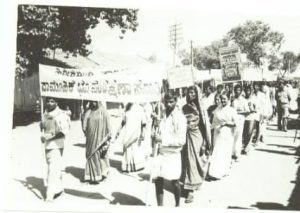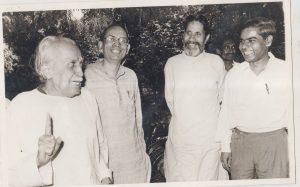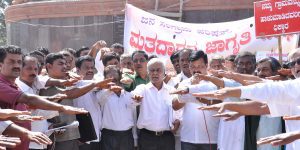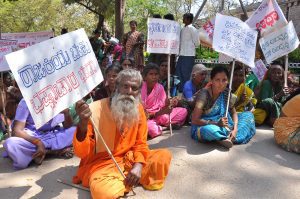The activist who exposed the Karnataka mining scam recently received the Badshah Khan Memorial Award. Hiremath is planning a massive satyagraha in the state in January 2023.

SR Hiremath received the Karnataka Rajyotsava award from poet-writer and Jnanpith recipient Chandrashekhara Kambara in 1987 (Supplied)
In 1995, the founder of a Dharwad-based voluntary organisation went to Khanapur in Karnataka’s Belagavi district posing as a research scholar studying biodiversity in the Western Ghats to gather information on rampant illegal mining. N Saini, an environmental activist, took him on his two-wheeler to a remote mining spot.
Even as they were approaching the mining area, some musclemen rushed towards them, questioning their reason for being there. Their explanation failed to convince those suspicious henchmen of the mining mafia.
By that time, a tall youngster with the physique of an athlete approached them menacingly, identified Saini, and threatened physical harm for trespassing into mining territory. At that time, the musclemen who surrounded the two cautioned their boss about a forest jeep approaching the spot. With their attention diverted, Saini took a U-turn on his two-wheeler and fled the scene before the musclemen could act.
Both Saini and the voluntary organisation leader decided against complaining to the Khanapur police station, knowing well that the local police were hand in glove with the mining mafia. On reaching Belagavi, they filed a written complaint with the superintendent of police with details of illegal mining in the Khanapur area and succeeded in getting an FIR registered against the attackers.
The man who dared to enter the den of the illegal mining mafia and returned unscathed is none other than Sangaiah Rachayya Hiremath, popularly known as SR Hiremath. The founder of Samaj Parivartana Samudaya (SPS), Hiremath was recently chosen by the ITM University Gwalior, Madhya Pradesh, for its prestigious Badshah Khan Memorial Award for 2022.

Land protection jatha by SR Hiremath’s Samaj Parivartana Samudaya (SPS) in the 80s (Supplied)
The university instituted this award in memory of freedom fighter ‘Frontier Gandhi’ Khan Abdul Ghaffar Khan. The award carries a cash prize of ₹1 lakh and a citation. The award is in recognition of Hiremath’s lifetime of dedicated work for meaningful social change inspired by non-violent Gandhian values and methods of social change adopted by Dr BR Ambedkar over the past 50 years.
Of course, awards and honours are nothing new to him. SR Hiremath, his SPS, and the National Committee for Protection of Natural Resources (NCPNR) with which he is associated have received many awards including the Indira Gandhi Paryavaran Puraskar, Jaap Van Praag international award by Hiyos, Netherlands, and the Karnataka Rajyotsava Award.
Recalling the Khanapur incident, Hiremath tells South First, “When the accused were produced in the court, they were shocked by my presence [as they believed he was a research scholar earlier and didn’t realise he was an activist taking on illegal mining]”.
Twenty-five years after this incident, Hiremath and some environmental activists were assaulted by a mob at Kethaganahalli near Bidadi in Ramanagara Assembly constituency when they sought to look into the lands allegedly grabbed by former chief minister and Janata Dal (Secular) leader HD Kumaraswamy. Supporters of Kumaraswamy threw eggs at Hiremath. Undeterred by the attack, Hiremath filed a police complaint, and subsequently an FIR was registered against the attackers.
Despite such incidents, Hiremath refuses to accept that he faced threats in his career as an environmental activist and crusader against illegal mining. “I did not get threats as such because of the preparation, precaution, and the kind of documentation SPS did throughout. However, when the mining scam was exposed, some people cajoled me to compromise and ‘settle’ the issue amicably,” Hiremath says, beaming his childlike smile.
Hiremath is waging a disciplined, non-violent battle against illegal mining in Karnataka and Andhra Pradesh, which is being controlled by a close nexus between politicians and the bureaucracy. He believes in the Indian judiciary strongly despite cynicism haunting him once in a while. He has chosen the legal route to protect natural resources from the greedy mining mafia.
Considering that the Supreme Court recently relaxed its order on production and sale of iron ore in Karnataka, 10 years after it clamped down on illegal iron ore mining, it appears that his battle is not yet over since the mining mafia will try to come back again, using the loopholes in the law.
Hiremath, with the support of SPS and through vigilant civilian action committees and non-violent resistance, is sure to continue his fight against corporates and a few powerful individuals plundering natural resources with impunity.
Born in a poor family on 5 November 1944 in Belavanaki village of Ron taluk, Hiremath was greatly influenced by the vachanas of the Sharana movement spearheaded by 12th-century social reformer Basavanna. Because of his commitment to the cause, he got himself engaged in protecting the biodiversity of the country and fighting corruption through SPS — a community for social change whose mission is protecting the rights of tribal communities and rural poor over natural resources and the empowerment of panchayat institutions.
After graduating in mechanical engineering, Hiremath worked as an investment banker and then joined the Federal Reserve Bank of Chicago. Having worked in the US for almost a decade, Hiremath quit his job and dedicated himself to the upliftment of the economically and socially backward classes in Karnataka, along with like-minded souls.
When he was in Chicago, he observed what was happening to the democracy in his country and met personalities such as writer and public intellectual UR Ananthamurthy.
When the Congress imposed the Emergency, Hiremath perceived that as a grave danger to democracy and staged protests near the Indian Embassy in Washington DC along with his friends. Because of this, his passport was cancelled.
“The reason for me to return to India was the promise I had made to my mother of serving our country,” says Hiremath, who was greatly inspired by the JP (Jayaprakash Narayan) movement during the Emergency in 1975.
On returning, he started the organisation India Development Services (IDS). The threat to biodiversity in the Western Ghats because of deforestation, and land encroachment and conversion attracted his attention.
“My association with the Western Ghats dates back to 1980 when we organised a march from its southern tip — Kanyakumari — to its northern tip in Maharashtra. Our SPS was the main coordinating organisation,” explains Hiremath.
His SPS has been working with local bodies and the NCPNR, which was founded by Kota Shivarama Karanth, Jnanpith recipient, writer, and environmentalist, and Chandi Prasad Bhatt, known for his work on subaltern social ecology and considered the country’s first modern environmentalist.

A young SR Hiremath (right) with environmentalist Chandi Prasad Bhatt (second from right) and others (Supplied)
Hiremath strongly believes in re-establishing community control and management of natural resources such as water, forest, land, and minerals, besides self-rule (empowered gram sabhas).
“This can be achieved by adopting a holistic and multidisciplinary approach to the issues of forestry and common lands that takes us to the core of our notions of ‘progress’ and ‘civilisation’. What we need is a second freedom struggle to place the issue of people’s control over livelihood resources and self-rule on the national agenda, a task unfinished by our freedom movement,” he observes.
In 1995, SPS came face to face with the eucalyptus species as a major social and economic issue in the context of the Karnataka Social Forestry Project (KSFP) and the controversial joint sector company, Karnataka Pulpwood Limited (KPL).
The SPS along with other environmental organisations worried over the predominance (over 80 percent) of eucalyptus species in both nurseries and plantations, especially in farm forestry. The eucalyptus was replacing food crops like ragi (pearl millet), jawar (sorghum), and other millets. The Forest Department was forcing eucalyptus species on the rural poor in both decentralised Kissan nurseries and department nurseries.
Under the SPS banner, Hiremath took on the powerful Karnataka Pulpwood Limited (KPL) over the question of eucalyptus or commercial species — and spearheaded a national campaign for the protection of common lands, with the support of NCPNR — through the effective legal intervention in the Supreme Court.
Hiremath and others succeeded in their attempts to protect common lands for the people’s livelihood needs, against privatisation by industrial and commercial forces including the powerful timber mafia. More importantly, he tried to find answers to the deeper question of land: Who controls it? Who decides what species to plant? And who benefits from them?
Though Hiremath focused on rural issues like a ‘yele marada kayi’ (‘an unripe fruit behind leaves, i.e. without coming to the forefront or seeking publicity), his desire for social change in rural Karnataka and his fight against rampant corruption were noticed by everyone in 2011 after a complaint filed with the Karnataka Lokayukta, then headed by Justice Santosh Hegde.
The Lokayukta submitted its landmark 466-page report to Governor H R Ranganath stating the estimated loss to the state exchequer because of illegal mining between 2006 and 2010 was more than `16,000 crore.
An in-depth investigation by The Hindu pointed out that the loss to the state exchequer was at the very least ₹1 lakh crore, much more than the figure in the Lokayukta report. The six-month-long investigation showed that the state lost ₹2,000 crore in commercial taxes itself.
The report led to the arrest of the then Karnataka chief minister BS Yediyurappa. Hiremath’s relentless fight against the illegal mining and plundering of natural resources in the name of development resulted in the apex court directing the Karnataka government to ban mining. It also led to the arrest of the then tourism minister Gali Janardhana Reddy. JD(S) leader HD Kumaraswamy was charged with misuse of office, corruption, and granting undue favours to the Mumbai-based Janthakal Mining Company.

SR Hiremath during the January 2013 voter awareness march in Bellary. The aim was to create awareness among people about illegal mining and urge them not to sell their votes (Supplied)
Hiremath, who is shy of publicity, maintained a low profile throughout the investigation by various central agencies. With his shirt tucked in and holding two big bags of documents that he collected, Hiremath used to brief media persons.
Employing their usual strategies to silence opponents, political outfits and top politicians tried to malign him. “They even checked my background and some alleged that my family was benefitting. But their strategy failed to yield any result as my life is like an open book and anybody can read that,” says Hiremath.
Hiremath depends mostly on public transport because of the paucity of funds for his “missions impossible”. At a time, when society is losing its faith in the people’s movements, Hiremath is optimistic at the age of 78.
“Though I opt for legal action to settle the issues, my heart is with peoples’ movements. Filing of Public Interest Litigations in the Karnataka High Court and the Supreme Court in Delhi helped the people’s movements to a great extent and resulted in big corporates bowing to the law of the land,” he says.
Asked about his views on present dispensation both at the Centre and state, he sounds apprehensive about the sanctity of the judiciary and executive.
“Of late, courts seem to not be showing any concern on certain issues pertaining to society, for instance, migrant workers. Courts are facing a trust deficit crisis. According to me, the country is facing the worst-ever crisis in the last eight years as fundamental rights enshrined in the Constitution are facing a serious threat. These are dark days in the country’s history. These times are worse than the times of Emergency of the 70s. There is an urgent need to build resistance against attacks on democracy,” he says with fury.
Confronting the Rashtriya Swayamsevak Sangh (RSS) head-on, Hiremath says, “The RSS, which failed to take participate actively in the freedom movement, is now taking the country back to pre-Independence days through its dangerous anti-democratic and communalist ideology. Guided by RSS, its political face BJP is trying to silence the dissent with impunity. Annihilating caste as argued by Dr Ambedkar is the only possible solution for the inclusive progress of the country.”
Dedicating the Badshah Khan Memorial Award to all those who stood with him in his journey as a social activist, Hiremath is all set to launch a massive pro-people movement demanding the Karnataka government repeal three draconian laws — Karnataka Prevention of Slaughter and Preservation of Cattle Act, Agriculture Produce Marketing Committee Act, and Land Acquisition Act.

People protest against political corruption during a dharna organised by SR Hiremath’s Samaj Parivartana Samudaya (SPS) in Bellary in January 2013 (Supplied)
Hiremath is presently busy creating a road map for his ambitious Samaja Parivarthana Satyagraha (movement for the transformation of society). His idea is to launch a 550-plus km padayatra from Koodalasangama in Bagalakote district (a place associated with the great 12th-century social reformer Basavanna) to Bengaluru.
The Satyagraha Yatra, according to him, will materialise in mid-January 2023. Over 600 yatris will walk and after the culmination in Bengaluru, they will conduct five days of dharna demanding the repeal of the three acts and urge the government to bring a legislation to legalise minimum support price (MSP).
“The BJP-led government both at the state and Centre are against the poor and depressed classes. Stretching the working hours much longer and suspending labour laws are the worst crimes committed by the BJP dispensation. We have to confront these moves with the ideals set forth by Buddha, Basava, Gandhi, and Ambedkar,” he says.
When asked whether he is optimistic about a change in dispensation both at the state and the Centre, Hiremath, without mincing words, says: “Nothing will change in society just because of the change of governments. Having said that, I am for the defeat of the BJP across the country, especially in Karnataka in the 2023 polls to the Assembly, as its continuation will be detrimental to the interest of all with the Bommai government dividing society in the name of religion. This will be dangerous for the diversified cultural texture of our society,” says Hiremath and adds, “I hope the media will play an important role in the endeavour, without succumbing to the ‘gift’ culture of the BJP dispensation”.
(Muralidhara Khajane is a senior journalist, writer, and film critic. He is the author of ‘Random Reflections: A Kaleidoscopic Musings on Kannada Cinema’. These are the personal views of the author)

Apr 21, 2024

Apr 16, 2024

Apr 16, 2024

Apr 16, 2024

Apr 17, 2024

Apr 14, 2024